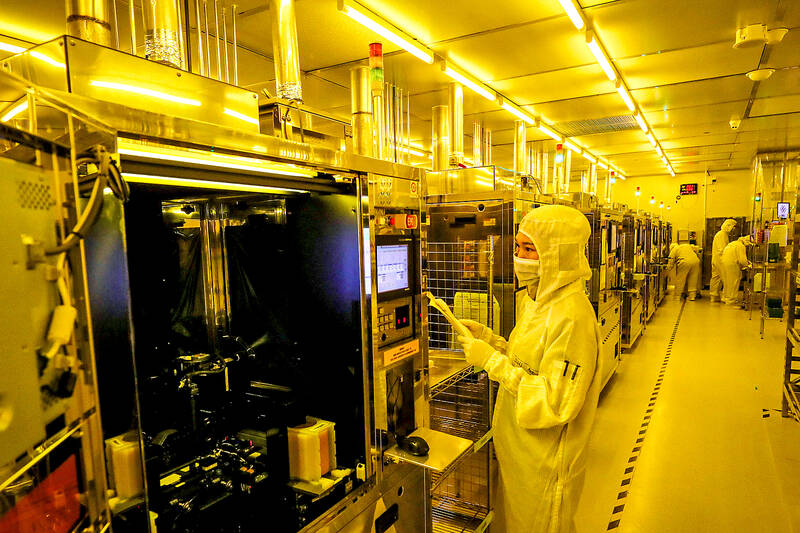Innotron Memory (合肥長鑫), the parent firm of China’s top chipmaker, Changxin Xinqiao Memory Technologies Inc (CXMT, 長鑫存儲), is to invest no less than 17.1 billion yuan (US$2.4 billion) in an advanced packaging plant in Shanghai that could be used to make artificial intelligence (AI) memory.
Innotron signed a contract with the local government this month via a Shanghai subsidiary to secure land, and the new site is expected to start production in mid-2026, official documents published on a Shanghai government website said.
The project would focus on a wide range of packaging technologies, including an advanced process called through-silicon via (TSV) required to make high-bandwidth memory used to power AI applications, one of the documents said. The facility is expected to provide packaging capacity for 30,000 units per month.

Photo: AFP
Innotron earlier this year secured a deal with a number of investors to raise a total of 10.8 billion yuan, according to a March exchange filing from GigaDevice Semiconductor Inc (兆易創新), one of the parties involved.
Innotron plays a critical role in China’s efforts to compete with the US in the emerging AI field, which requires cutting-edge semiconductors. However, China’s chipmaking capabilities have been hampered by a US-led multinational campaign to restrict Beijing’s access to advanced equipment, a sector that is dominated by American, Dutch and Japanese suppliers.
The administration of US President Joe Biden has also banned Nvidia Corp from selling its most cutting-edge AI semiconductors to China, which is depending more on alternative offerings from Huawei Technologies Co (華為). However, it is unclear who is making high-bandwidth memory for Huawei’s AI accelerators.
CXMT started developing chipmaking technologies eight years ago, with patents from now defunct German firm Qimonda AG. It makes chips used in a wide range of products, including computer servers and smart vehicles. It is also trying to develop AI memory, media outlets have reported.
It competes with US-based Micron Technology Inc and South Korea’s Samsung Electronics Co and SK Hynix Inc.
The Innotron subsidiary has drawn US scrutiny, with the Biden administration weighing sanctions against the Chinese chipmaker, Bloomberg News has reported.

Shares in Taiwan closed at a new high yesterday, the first trading day of the new year, as contract chipmaker Taiwan Semiconductor Manufacturing Co (TSMC, 台積電) continued to break records amid an artificial intelligence (AI) boom, dealers said. The TAIEX closed up 386.21 points, or 1.33 percent, at 29,349.81, with turnover totaling NT$648.844 billion (US$20.65 billion). “Judging from a stronger Taiwan dollar against the US dollar, I think foreign institutional investors returned from the holidays and brought funds into the local market,” Concord Securities Co (康和證券) analyst Kerry Huang (黃志祺) said. “Foreign investors just rebuilt their positions with TSMC as their top target,

REVENUE PERFORMANCE: Cloud and network products, and electronic components saw strong increases, while smart consumer electronics and computing products fell Hon Hai Precision Industry Co (鴻海精密) yesterday posted 26.51 percent quarterly growth in revenue for last quarter to NT$2.6 trillion (US$82.44 billion), the strongest on record for the period and above expectations, but the company forecast a slight revenue dip this quarter due to seasonal factors. On an annual basis, revenue last quarter grew 22.07 percent, the company said. Analysts on average estimated about NT$2.4 trillion increase. Hon Hai, which assembles servers for Nvidia Corp and iPhones for Apple Inc, is expanding its capacity in the US, adding artificial intelligence (AI) server production in Wisconsin and Texas, where it operates established campuses. This

US President Donald Trump on Friday blocked US photonics firm HieFo Corp’s US$3 million acquisition of assets in New Jersey-based aerospace and defense specialist Emcore Corp, citing national security and China-related concerns. In an order released by the White House, Trump said HieFo was “controlled by a citizen of the People’s Republic of China” and that its 2024 acquisition of Emcore’s businesses led the US president to believe that it might “take action that threatens to impair the national security of the United States.” The order did not name the person or detail Trump’s concerns. “The Transaction is hereby prohibited,”

Garment maker Makalot Industrial Co (聚陽) yesterday reported lower-than-expected fourth-quarter revenue of NT$7.93 billion (US$251.44 million), down 9.48 percent from NT$8.76 billion a year earlier. On a quarterly basis, revenue fell 10.83 percent from NT$8.89 billion, company data showed. The figure was also lower than market expectations of NT$8.05 billion, according to data compiled by Yuanta Securities Investment and Consulting Co (元大投顧), which had projected NT$8.22 billion. Makalot’s revenue this quarter would likely increase by a mid-teens percentage as the industry is entering its high season, Yuanta said. Overall, Makalot’s revenue last year totaled NT$34.43 billion, down 3.08 percent from its record NT$35.52